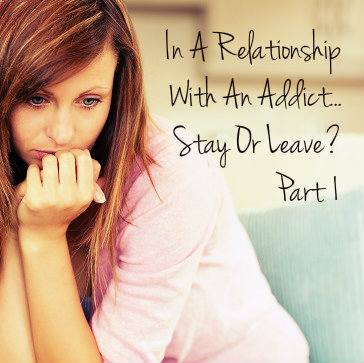In A Relationship With An Addict: Stay Or Leave? Part 1
You know your partner battles an addiction and you’ve seen the toll it is taking on your relationship, not to mention your own well-being and sanity. Yet you stay. And the problem continues. How do you recognize an addict’s excuses? Is it possible to have a healthy relationship with an addict? Should you even try? How do you decide when it’s time to call it quits?
Unhealthy Attracts Unhealthy In Relationships
 It helps to begin with a little soul searching. What keeps you in a relationship with an addict in the first place? The reality is that people who maintain relationships with addicts are often operating from a place of co-dependency and emotional neediness. Whether or not you stay in the relationship, it is probably time to start looking at some of your own issues.
It helps to begin with a little soul searching. What keeps you in a relationship with an addict in the first place? The reality is that people who maintain relationships with addicts are often operating from a place of co-dependency and emotional neediness. Whether or not you stay in the relationship, it is probably time to start looking at some of your own issues.
It is easy to make the relationship about the other person and his or her addiction and to be constantly focused on catering to the needs of the one who seems to be the “problem.” As a result, the non-addict doesn’t see the need to work on him or herself. In normal relationships, each partner is growing and changing in partnership with the other. In the case of a relationship with an addict, however, this normal growth and progression stagnates—often for both partners.
Examine Your Motives When In A Relationship With An Addict
People in relationships with addicts often avoid trying to honestly discover why they are in the relationship in the first place. No one can tell you it is time to end the relationship, but you might ask yourself why you think you want, or need, to stay.
Questions To Help You Work Through The Feelings Of Continuing Or Ending The Relationship With An Addict
- Are you afraid of being alone?
- Are you afraid you can’t find anyone better than your current partner?
- Do you believe that you can change him/her?
- Do you think you can love him/her out of the addiction and into a clean life?
- Do you optimistically believe that somehow things will just work out, even though there had been no evidence of that?
- Do you tell yourself it’s not that bad?
- Are you afraid of drastic consequences if you leave the addict? Has he or she threatened harm to self, you, or others if you end the relationship?
- Are you avoiding the hassle? Are you too lazy to make the break and deal with the consequences of splitting possessions and potentially having to find another place to live?
- Are you afraid to discuss the problems in your relationship or your desire to leave for fear of starting a fight? Are you afraid of physical abuse?
- Is the addict working to convince you there isn’t a problem, but maybe your gut is telling you differently?
- Has the addict vowed to go to AA, but failed to follow through?
- Do you think the addict can’t make it on his own without you?
- Are you afraid to present an ultimatum?
More “yes” answers than “no” suggest strong co-dependent tendencies.
Work On You And Your Own Issues
Any time spent in a relationship with an addict can be crazy-making. It is time to start working on you. Seeking your own recovery can often help you to better decide whether you should try to keep the relationship going or end it.
Start by attending an Al-Anon meeting in your area. Al-Anon can help you to better understand addictive patterns and tendencies and give you the tools and support for working with them. You will learn about yourself, and why you stay with an addict, and how to set better boundaries if you do stay in the relationship.
Co-Dependents Anonymous (CODA) is another group worth seeking out. Partners of addicts commonly suffer from codependent tendencies. A group like CODA takes the focus off of healing the addict and puts it onto healing and discovering you.
Whether or not you choose to stay with the addict, and whether or not he or she will get help, you need help and support in dealing with the addiction, and eventually healing from it.
People who have been brainwashed by a relationship with an addict often repeat unhealthy relational patterns in subsequent relationships. Attending Al-Anon can help the non-addict partner learn the realities of addiction and co-dependence, and can be an eye-opening experience of personal growth and development.
Hitting Bottom In The Relationship
As you wait for the addict to hit bottom and reach his or her limits, you might think about your own limits. What does it mean for you to hit bottom in this dysfunctional relationship? Partners of addicts become accustomed to responding to the needs of the addict without considering their own personal needs and preferences. In order to be ready to leave the relationship, you will have to hit your own bottom—the place of complete despair and desperation. It is at this point that you will be ready for a change. Have you hit bottom in your relationship with the addict?
Continued In – In A Relationship With An Addict: Stay Or Leave? Part 2



